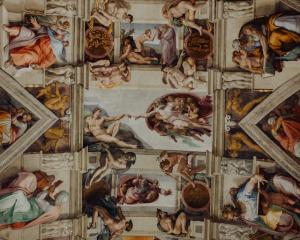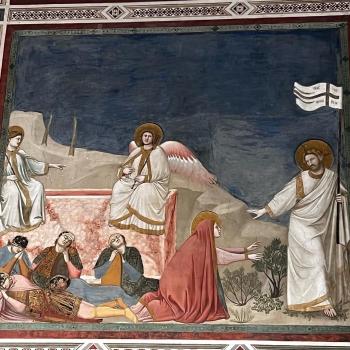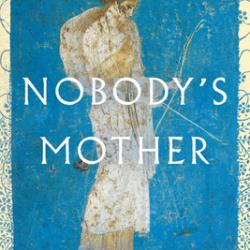
“This order of creation argument is just silliness.” So said Baylor history professor Beth Allison Barr, author of the bestselling The Making of Biblical Womanhood, in a recent feature article in the New Yorker. The thesis of Barr’s book is that patriarchy, the cultural system in which men hold the power, has morphed in recent decades into complementarianism, the theology that says God made men and women equal in being but separate in function. One of the foundational pillars of complementarianism is what we call “order of creation.”
The theory says: By virtue of Adam being created before Eve (seen in Genesis 2), men were given authority by God over women. Some call that authority “headship,” borrowing an idea from the New Testament. The man and woman both share dominion over the world (we find that in Genesis 1), but men are in some way more in charge than women over the rest of creation.
Scholars point to several reasons they support male authority, but here I want to explore the strength and validity of creation order. Does it really matter that the man was formed before the woman? Did Adam’s creation before Eve’s grant him—and, by extension, all males—any special benefits? What’s the significance of being first in Scripture?
The Premise
As I argue elsewhere, complementarian theology is based on hierarchy. Creation order is probably the heftiest pillar on which this theology stands. Wayne Grudem, the co-founder of the organization that teaches biblical hierarchy, sums it up this way, “Adam was created first, was put in the garden and given commands by God, and Eve was created as a helper for Adam; in that sequence of events God gave Adam a leadership role.” (EFBT, 68)
Grudem goes on to argue that, in the Hebrew family and in much of the ancient world, everyone would have understood male priority, also called primogeniture. This pattern, he says, preserves a certain order, is for all time, and will result in God’s best for everyone.
Primogeniture and patriarchy indeed dominated throughout the Middle Eastern and Western civilizations for centuries. (The Far East, too, but I do not know their histories as well, and Hebrew cultural influence did not extend that far.) The lineage of the British royal family, for instance, has been ruled by male-preference primogeniture for a thousand years. Only in 2013 was the male-preference primogeniture law amended to omit male preference and allow females to retain their rank in the line of succession even when a brother might be born later. (This is why Princess Charlotte would be queen before her younger brother, Louis, whereas before 2013 he would have bypassed her to the throne.)
How does the Bible support creation order as a God-ordained pattern in society?
The Receipts

Genesis 1 speaks of God creating mankind in his image, male and female he created them (1:28). No hierarchy there. Genesis 2 depicts the creation of the man and woman without any verbal hint that they are not equal in every way. When he sees the woman for the first time, the man breaks out into poetry exclaiming that now, NOW, he had a companion like him—”bone of my bone, flesh of my flesh”—in contrast to all the creatures he had just observed in their pairs. Now, finally, there was someone like him.
The emphasis in these verses lies on the compatibility and likeness of the two, not on who came first. No hierarchy here, either. Those who see hierarchy in this chapter have read it into this text, extrapolated from other passages. Or they just assume hierarchy is there between the two humans. Scholars frown upon eisegesis, the reading into a text what isn’t in there. Good Bible study uses exegesis, pulling out of a text truth that lies within it.
So the text of Genesis 2, in the perfect Garden where God walks with his image-bearers, does not teach hierarchy. (It doesn’t take long, though. Just turn to chapter 3 when sin enters the picture.)
The rest of the Old Testament is full of stories of men whom God used to further his purposes. He chose Abraham as the first of the patriarchs—Abraham, Isaac, and Jacob are the beloved founders of the people of Israel, whose story we follow in the Bible. He chose Moses to lead his people out of slavery and Aaron to be their high priest. He chose David to lead them into victory and political strength, and Isaiah and Jeremiah (among many other males) to prophesy and teach his ways to the people. We find many godly men in the pages of scripture.
The dominance of men in the Bible is a product of patriarchy—men ruled society. And God did choose many of them to lead his people spiritually, politically, and physically. But he also used women, whose stories can get lost in the shuffle and minimized through neglect. This post highlights women who may be obscure or overlooked in the Bible.
But creation order assumes male dominance because they were made first, not just because they are males. So primogeniture is more the issue here than general patriarchy. And the Bible subverts that theory time and time again. A few examples:
Jacob and Esau
In Genesis 25, Isaac’s wife Rebekah was pregnant with twin boys. Before she gave birth, the Lord told her that “the older will serve the younger” (Genesis 25:23). This prophecy came to fruition in the lives of Jacob and Esau, with Jacob, the younger, receiving God’s favor and carrying on the Israelite lineage. He is the third patriarch, father of the twelve sons who would become the twelve tribes of Israel.
Gideon
In Judges 6:11, Israel is under the oppression of a neighboring country. God sends an angel to Gideon, a son of a farmer in the tribe of Manassah, who is “threshing wheat in the winepress in order to hide it from the Midianites. Then the angel of the Lord appeared to him and said, ‘The Lord is with you, valiant warrior’” (Judges 6:11–12). Not so valiant! (We’re supposed to laugh at the irony.) Gideon protests that his family is one of the weakest in the tribe, and that he was the youngest in the family (v 15). Yet God chose him to rout the enemy and become the next judge over the people.
David
In 1 Samuel 16, God instructed Samuel to find and anoint the next king of Israel. David’s father, Jesse, brought his sons, all except the youngest, assuming that Samuel would choose from the older boys. But God didn’t affirm any of the seven older sons; instead, God told Samuel,
“Do not consider his appearance or his height, for I have rejected him. The Lord does not look at the things people look at. People look at the outward appearance, but the Lord looks at the heart.” Then Samuel asked Jesse if he had any more sons. “There is still the youngest,” Jesse answered. “He is tending the sheep.” When young David arrived, the Lord said to Samuel, “Rise and anoint him; this is the one” (1 Samuel 16:7, 11–12).
Others
Back to the beginning—Cain was the firstborn of Adam and Eve, yet he murdered his brother and was cast out. His younger brother Seth carried on the family line. Isaac, though the younger of Abraham’s sons, was the “child of promise” who God chose to bless and work through. Judah, one of the twelve sons of Jacob, was given leadership even though he was the fourth son. Moses was the younger brother of Aaron and Miriam, yet God chose him to lead his people. Solomon had several older brothers in line to inherit the throne of Israel, but God told David to appoint Solomon king after him.
What about Jesus?
An accurate but underused adjective for Jesus is subversive. Jesus subverted the patterns of his day. How so?
He didn’t have a lot of time for power plays and ranking. When Jesus’s disciples were arguing about who was the greatest among them, Jesus said to them, “Anyone who wants to be first must be the very last, and the servant of all” (Mark 9:35). Then he took a little child in his arms as an object lesson. Later he told his disciples, “But many who are first will be last, and the last first” (Mark 10:31).
Jesus certainly didn’t collect the leaders of society around him: many of the disciples were uneducated fishermen, or they were despised traitors who collected taxes for the hated Romans. And yet he empowered them to change the world.
He was the King of kings who died a pauper with a mocking sign above his head saying “king of the Jews” (the irony!). He was the perfect, sinless one who was executed as a criminal. In his economy, leaders are slaves (doulos), honor should be sacrificed on behalf of others, power is given not for authority but for service to the lowly. Blessed are the poor, for they shall see God.
Heterarchs (who see no God-ordained hierarchy between men and women) challenge Christians to decide whether being first reflects God’s attributes, his character, and what he values most. Heterarchs believe the “order of creation” argument to put males in a permanent leadership role in the family, church, and community is not in sync with the overall tone of the Scriptures and who God has revealed he is.
Conclusion
What do you think? Do hierarchs have a point? Did God create men and women to relate in a hierarchy in which the man rules, however benevolently, over the woman? Does this order within families and societies reflect God’s character? Or did he make men and women to relate in a mutual manner, sharing responsibilities in their co-dominion over the earth? Is creation order a silly concept on which to base how men and women relate to one another?
*Remember that hierarchs have other arguments to defend their position as well. We are only covering creation order in this post. Interested in reading more on the topic of women in the Bible? See this post for a short list of resources.
**EFBT = Evangelical Feminism and Biblical Truth, by Wayne Grudem (2004).












